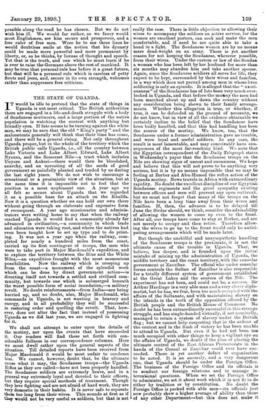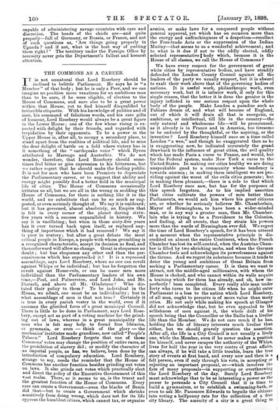THE STATE OF UGANDA.
IT would be idle to pretend that the state of things in Uganda is not most critical. The British authorities there are engaged in a life-and-death struggle with a body of Soudanese mutineers, and a large portion of the native population is watching the contest with anything but friendly eyes. If fate seems to be turning against the white men, we may be sure that the old "King's party" and the malcontents generally will think that their time has come, and there will be a general rising. Not only throughout Uganda proper, but in the whole of the territory which the British public calls Uganda, i.e., all the country between Lake Victoria and Lake Albert Edward, Lake Albert Nyanza, and the Somerset Nile—a tract which includes Unyoro and Ankori—there would then be bloodshed, anarchy, and an uprooting of all the seeds of good government so painfully planted and tended by us during the last eight years. We do not wish to encourage a sensational or a pessimistic view of the situation, but at the same time it is impossible not to feel that the position is a most unpleasant one. A year ago we all felt so secure about Uganda that we regarded it as a possible base for an attack on the Khalifa. Now it is a question whether we can hold our own there without going through an elaborate and expensive form of reconquest. A year ago missionaries and adminis- trators were writing home to say that when the railway reached Uganda it would find a community already far advanced in civilisation,—a community in which trade and education were taking root, and where the natives had even been taught how to set up type and to do print- ing. It was not a year ago when the railway, com- pleted for nearly a hundred miles from the coast, carried up its first contingent of troops, the men who were to take part in Major Macdonald's expedition, and to explore the territory between the Blue and the White Niles,—an expedition fraught with the most momentous possibilities. Now the railway which is creeping up from the coast—a monument of the splendid work which can be done by direct government action—is directing itself not towards a settled and civilised. com- munity, but towards one which is submerged beneath the worst possible form of social inundation,—a military revolt. No doubt reinforcements—from India—are being hurried up, and no doubt, also, Major Macdonald, who commands in Uganda, is not wanting in bravery and energy, and in all probability they will be successful in restoring order and quelling the revolt. That, how- ever, does not alter the fact that instead of possessing Uganda as we did last year, we are engaged in fighting for it.
We shall not attempt to enter upon the details of the mutiny, nor upon the events that have succeeded it. Our readers will find these set forth with con- siderable fullness in our correspondence columns. Here we must dwell rather upon the general aspects of the situation. Till detailed reports have been received from Major Macdonald it would be most unfair to condemn him. We cannot, however, doubt that, be the ultimate cause what it may, the Soudanese troops—the Uganda Rifles as they are called—have not been properly handled. The Soudanese soldiers are extremely brave, and in a general way extremely loyal and devoted to their officers, but they require special methods of treatment. Though they love fighting and are not afraid of hard work, they are very domestic in their habits. It is never safe to separate them too long from their wives. This sounds at first as if taay would not be very useful as soldiers, but that is not really the case. There is little objection to allowing their wives to accompany the soldiers on active service, for the women are excellent porters, can cook and make the men comfortable, and if need be are quite able to take a. hand in a fight. The Soudanese women are by no means mere dead-weight on an army. There is yet another reason for not keeping the Soudanese, wherever possible, from their wives. Under the custom or law of the Soudan a woman who has been left by her husband for more than six months may abandon him and take another spouse. Again, since the Soudanese soldiers all serve for life, they expect to be kept, surrounded by their wives and families, in a way which does not prevail among men in whose lives soldiering is only an episode. It is alleged that the "uxori- ousness" of the Soudanese has of late been very much over- looked in Uganda, and that before the mulany the men had been marched about up and down the country without any consideration being shown to their family arrange- ments. Whether this allegation is true, or whether, if true, it can be defended on the ground of necessity, we do not know, but in view of all the evidence obtainable we certainly incline to the belief that the Soudanese have been badly handled, and that this bad handling has been the source of the mutiny. We know, too, that the Soudanese under a former administration gave no trouble, and were loyal and useful soldiers. In any case, the result is most lamentable, and may conceivably have con- sequences of the most far-reaching kind. We note that the Egyptian correspondent of the Daily Telegraph states in Wednesday's paper that the Soudanese troops on the Nile are showing signs of unrest and uneasiness. We hope and believe that this will not prove to be anything very serious, but it is by no means impossible that we may be feeling at Berber and Abu-Hamed the reflex action of the Uganda mutiny. News travels in Africa with extraordinary rapidity. No doubt the excellent discipline of our Egyptian Soudanese regiments and the great sympathy existing between officers and men will prevent any open outbreak, but we must not forget that many of the troops on the Nile have been a long time away from their wives and families. If, then, the advance is to be delayed till June the Sirdar should, we think, consider the advisability of allowing the women to come up even to the front. After all, our troops have come to stay at Barber, and are not merely to occupy and then retire. Therefore allow- ing the wives to go up to the front would only be antici- pating arrangements which will be made later.
But though the unskilful and unsympathetic handling of the Soudanese troops is the proximate, it is not the ultimate cause of the trouble in Uganda. That, we believe, lies deeper, and is founded upon the initial mistake of mixing up the administration of Uganda, the middle territory and the coast territory, with the consular government at Zanzibar. The official who under consular forms controls the Sultan of Zanzibar is also responsible for a totally different system of government established at the Great Lakes and the sources of the Nile. The experiment has not been, and. could not be, a success. Sir Arthur Hardinge is a very able man and a very clever diplo- matist, but he has, we fear, been too much occupied with the affairs of the Sultanate, and with maintaining slavery on the islands in the teeth of the opposition offered by the British people and the British House of Commons. No doubt he has been extraordinarily successful in this strange struggle, and has single-handed virtually, if not nominally, managed to retain a system of slavery under the British flag ; but we cannot help suspecting that in the ardour of the contest and in the flush of victory he has been unable to attend to Uganda. But even if he had not been too much occupied with other things to keep a vigilant eye on the affairs of Uganda, we doubt if the plan of placing the ultimate control of the East African Protectorate in the hands of the Consul at Zanzibar could ever have suc- ceeded. There is yet another defect of organisation to be noted. It is an anomaly, and a very dangerous one, that Uganda should be under the Foreign Office. The business of the Foreign Office and its officials is to conduct our foreign relations and to manage in-. ternational questions. When we set the Foreign Office to administer, we set it about work which it is not fit to do either by tradition or by constitution. No doubt the Foreign Office is packed with able men—its officials just now probably show a higher average of ability than those of any other Department—but this does not make it capable of administering savage countries with care and discretion. The heads of the Chiefs are—and quite properly—full of Germany, or Russia, or France, and not of such questions as, Are things going properly in Uganda ? and if not, what is the best way of putting them right ? ' The territory under the Foreign Office by necessity never gets the Department's fullest and keenest attention.



















































 Previous page
Previous page